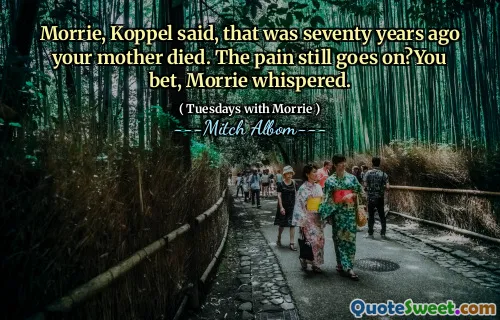And this is what living next to a waterfall is like, Safran. Every widow wakes one morning, perhaps after years of pure and unwavering grieving, to realize she slept a good night's sleep, and will be able to eat breakfast, and doesn't hear her husband's ghost all the time, but only some of the time. Her grief is replaced with useful sadness. Every parent who loses a child finds a way to laugh again. The timbre begins to fade. The edge dulls. The hurt lessens. Every love is carved from loss. Mine was. Yours is. Yor great-great-great-grandchildren's will be. But we learn to live in that love
The quote from Jonathan Safran Foer's "Everything Is Illuminated" reflects on the profound journey of grief and healing. It illustrates how, after enduring deep sorrow, individuals gradually come to terms with their loss. Widows find moments of peace after years of mourning, as their intense grief transforms into a more manageable sadness that allows for the possibility of joy and daily life. Parents who have lost children begin to rediscover laughter, highlighting the human capacity to adapt and find moments of light even in darkness.
This idea emphasizes that love is often intertwined with loss and that our relationships remain significant despite the pain. The narrative suggests that everyone experiences this cycle of love and loss, which shapes their lives and identities. As time passes, the sharpness of grief diminishes, allowing people to cherish their memories while embracing new experiences. Ultimately, it portrays a hopeful message about resilience and the enduring nature of love, as future generations will also confront loss but learn to live with it as part of their journey.





